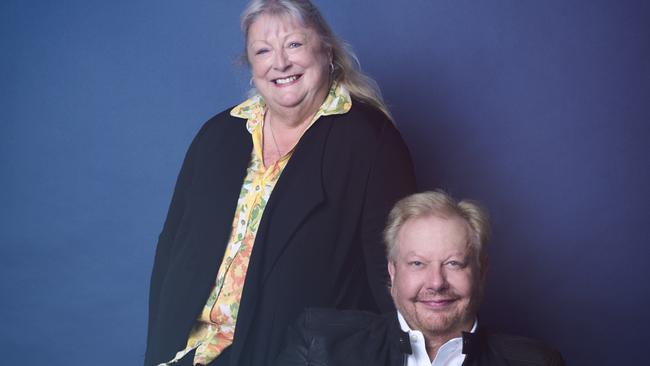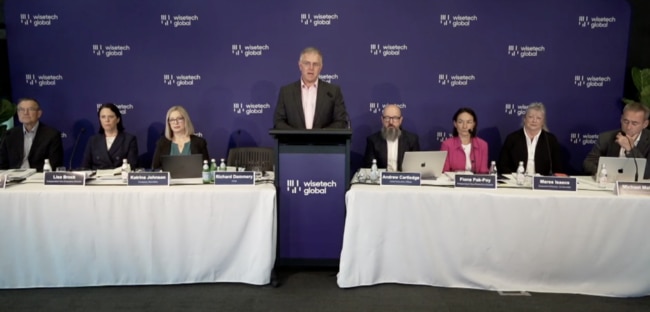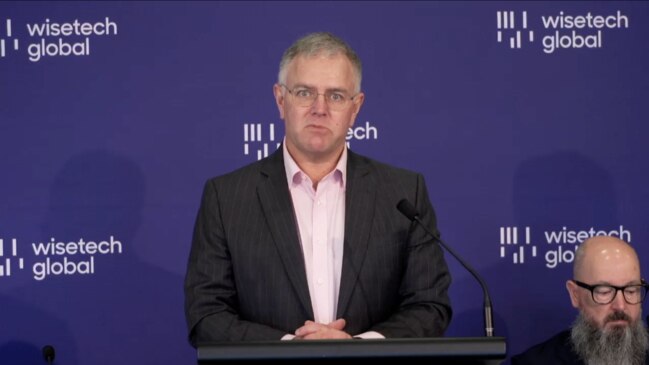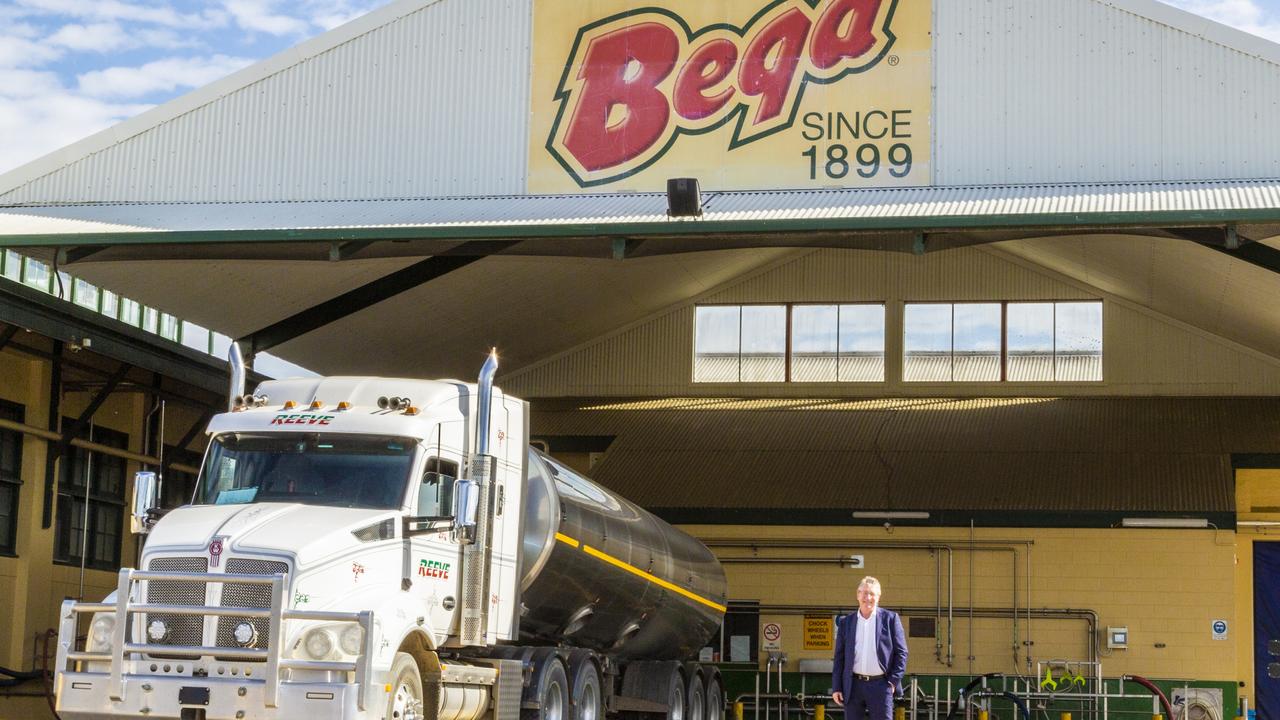WiseTech’s Richard White to eyeball investors following sex scandal
The billionaire founder is set to eyeball investors for the first time since allegations surfaced that he exchanged business advice for sex, and since co-founder Maree Isaacs sold her $1.3bn stake in the company.

Business
Don't miss out on the headlines from Business. Followed categories will be added to My News.
WiseTech founder Richard White is set to eyeball investors for the first time since sensational allegations surfaced – including that he exchanged business advice for sex – and his co-founder Maree Isaacs sold her $1.3bn stake in the company.
The $42.33bn software logistics group will hold its annual investor day at Sydney’s W Hotel, where Mr White will appear in a “fireside chat” with chairman Richard Dammery and interim chief executive Andrew Cartledge, on Tuesday.
Shareholders and analysts will be looking for more detail about how much delayed product launches will cost the company.
WiseTech downgraded its earnings, minutes before its annual meeting 10 days ago – with chair Richard Dammery citing the allegations surrounding Mr White. At the ‘virtual only’ AGM, Ms Isaacs was granted $250,000 worth of share rights, as part of its short-term incentive plan.
There was no mention that she planned to sell her entire stake in the company to Mr White, which was not disclosed until late on Friday evening. She will remain a director of WiseTech, unlike Mr White, who has resigned from its executive and board.
Ms Isaacs said she was selling to “unlock value”. Australian Shareholders Association chief executive Rachel Waterhouse said it was not known how long Ms Isaacs had been planning her move.
“It’s sometimes hard to know what goes on behind the scenes and how long this has or hasn’t been discussed,” Ms Waterhouse said, adding that Ms Isaac’s decision had not hit the company’s share price.
“With a lot of those issues and scandals that have come about, it keeps on going up, so there is confidence in the organisation, and there’s recognition from one or two members that I’ve spoken to today that she probably just wants to unlock that value.
“She’s at a point in her life where she wants to enjoy her time. There is no concern at this point in time from retail shareholders.”

The ASA wrote in its voting intentions ahead of the annual meeting that it was against the awarding of share rights to Ms Isaacs. It said while it was a “modest amount” it formed part of the remuneration structure that “ASA has voted against”.
The association recommended a vote against WiseTech’s remuneration report, citing a lack of a long-term incentive plan, and urged a more “mature” payment structure after the “recent blows to the reputation of the company”.
“Despite being an ASX20 company thanks to its success, the remuneration structure is more common to that found in a start-up. With no real remuneration structure that builds in future planning and behaviours culture, we consider that despite a lot of good, the bad outweighs it.”
More than 98 per cent of shareholders voted in favour of WiseTech’s remuneration report.
Ms Isaacs – who Mr White told The List: Australia’s Richest 250 this year that they were “a bit more than friends for a time” before striking an entrepreneurial partnership – will reap an initial payment of $285m for her shareholding.
She will then receive future quarterly payments based on the volume weighted average price of WiseTech shares over a period of up to seven years.

Ms Isaacs owned WiseTech shares via her 8 per cent stake in RealWise Holdings, which controls about 37.4 per cent of WiseTech. Mr White owns the other 92 per cent of RealWise Holdings.
Mr White had been steadily selling his holding in WiseTech, which was 40.9 per cent in April last year.
He told investors at the annual meeting that while he was selling, he would remain a substantial shareholder in the company he founded 30 years ago.
“I’ve always taken the view that a gentle, orderly, predictable sell down is an appropriate thing for somebody who has a large stake and who is a founder and creator of the company. And I continue to have that view,” Mr White said.
“I also continue to have the view that I will remain a substantial shareholder for the very long term.”
AustralianSuper – which is WiseTech’s fourth-biggest shareholder with a 2.79 per cent stake, making it the second-largest external investor in the company – declined to comment on Ms Isaac’s sale.
The fund had previously backed Mr White’s decision to stand down from WiseTech’s executive and board and into a new consulting role, keeping is $1m a year salary.

The ASA expressed the conundrum the company faced with its billionaire founder ahead of the annual meeting, despite a review from external law firms so far finding no evidence of wrongdoing.
“It is acknowledged that if Richard White were suddenly not involved at all with the company, the share price would plunge. At the same time, the board could not allow the ongoing reputation harms to continue without responding.
“The media was captivated by the titillating tale of the Founder/CEO and owner of 34 per cent of the share capital, Richard White, and the claimed multiple lovers and his habit of buying them lovely expensive houses along the way. However, outside of making him the pin up boy for the real estate industry, the market and media was grappling with whether this was a purely personal matter or a professional matter at odds with his responsibilities as a CEO and director?
“Corporate governance and reputation very much incorporates the perceptions of a company’s officers. The accusation that sex was traded for advice and favours was at odds with all the company had talked and written about its culture, inclusiveness and transparency. Added to this, the allegation that at least one director left the board because of the bullying atmosphere and poor governance, crystallised a reputational crisis.”

It has already sparked an earnings downgrade. WiseTech expects to deliver revenue of $1.2bn to $1.3bn in fiscal 2025, representing revenue growth of 15 to 25 per cent versus fiscal 2024. This compares with the company’s previous guidance of $1.3bn-$1.35bn.
Earnings before interest, tax, depreciation and amortisation is expected to be $600m –$660m. This compares with previous guidance of $660m –$700m.
Citi analyst Siraj Ahmed said the downgrade had “made the monetisation potential of the three new products even more topical” and would look for more details during panel discussions during the investor day.
“The bullish take from the recent earnings downgrade is that the revenue potential from Container Transport Optimisation is much larger than expected. Our view is that the downgrade was not just about CTO, and we look to learn more in the session about Landside Logistics,” Mr Ahmed wrote in a note to investors.
“With regard to CargoWise Next, the next generation platform that is expected to be released soon, the key question is the monetisation potential of the new product features in it. We also look for detail on the take-up and rollout of ComplianceWise, which was released in October.
“Interestingly, the agenda does not have a session on CargoWise Neo. While Neo is not expected to be a revenue generator in the near term, it is seen as key to extending CargoWise to the shippers/beneficial cargo owners by leveraging the global logistics operators.”
Originally published as WiseTech’s Richard White to eyeball investors following sex scandal



